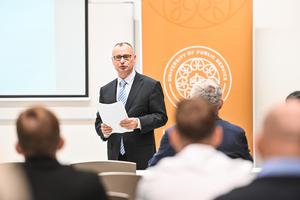On 21 November, Jaroslav Franc, professor at Palacky University in the Czech Republic and founding head of the Department of Communication Studies at the institution, gave a lecture.
At the beginning of the presentation, Iván Gyurcsík, director of the Ludovika Scholars Program, introduced the program and welcomed the guests. Lóránd Ujházi then presented the work of Jaroslav Franc. The workshop was attended by the staff of the Institute and other invited professors and researchers. According to the character of the workshop, it was a half-hour interactive lecture followed by a Q&A session.
In the first half of the event, the presenter shared the results of his research on the current state of interreligious and ecumenical dialogue in post-socialist societies. As an introduction, he presented some data on attitudes toward religion in the societies of Central and Eastern Europe, which showed that the region is basically well divided into Catholic and Orthodox majority states. Through the three types of contexts of religiosity – belief, practice and affiliation – he highlighted, in the form of a case study, a number of noteworthy factors showing that there is a wide variation in the proportion of people who identify themselves as belonging to a particular denomination, those who practice their faith regularly and those who genuinely agree with the teachings of the Church on matters of faith. With regard to Catholics and Orthodox, the speaker drew attention to the difference between the two denominations in that the former, because of their supranational nature, have a less strong link between national and religious identity, while the latter, because of their nationality, have a symbolic pillar in the maintenance of national identity.
Regarding the role of the churches, Jaroslav Franc pointed out that secularization, a general distrust of institutions and different religiosity have created new challenges and opportunities for church leaders, which can be seen in the change of communication style. Through an analysis of the speaking styles of the last three popes, he showed that while the use of the imperative was predominant under John Paul II and Benedict XVI, since the pontificate of Francis there has been less use of explicit expressis verbis, with only a hint of it between the lines. The speaker concluded that Church leaders are aware of the difficulties posed by social media and the modern age, one of the phenomena of which is the rise of dialogue and conversation. Franc Jaroslav emphasized that the dynamics of the various intentions mentioned above – faith, practice and belonging – are fundamental to the religiosity of Central and Eastern European societies.
The presentation was followed by a lively exchange of views among the participants, who reflected on the presentation and sought to explore other aspects of the context of the theme through further questions. At the end of the event, At the end of the meeting. Lóránd Ujházi, head of the Research Institute for Religion and Society, expressed his gratitude to Jaroslav Franc for his presentation and for the work they had done together.


